Part 63: Victoria: Chapter 3 - Inferno: 1810 -1814
1810 - 1814: Inferno
A retired general and a score of officers are sent to the Qin, along with a small guard of soldiers, to help the Qin Emperor train his troops and plan his strategy.

Seeing an opportunity to get back at their hated rivals, the Ming offer their armies to the Sibir Khan in exchange for the southern Qin territories. Tümen Khan accepts, and Ming enters the war.

Back in Europe, Swabia has its own war to worry about. Its coalition can muster some 55 divisons, with another 20 in reserve, while the Iberians and French are estimated to have 56 divisions, and 15 in reserve. Unfortunately much of Lithuania's troops are spread across its vast empire, and will not be able to reach the front for months.
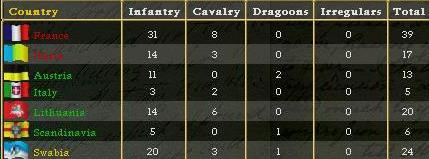
The French have unwisely left several of their frontier provinces lightly defended, and Mathias orders a wide-front offensive.
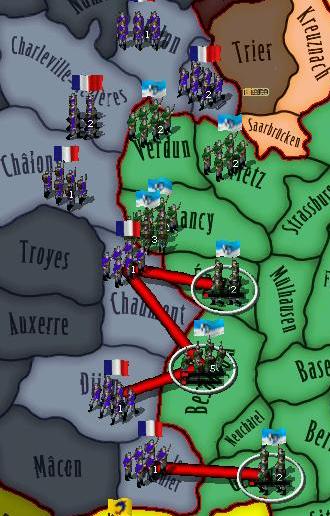
Austria and Lithuania place a number of divisions at Mathias' disposal, and they are ordered to march towards Stuttgart and rally there for deployment to the front.
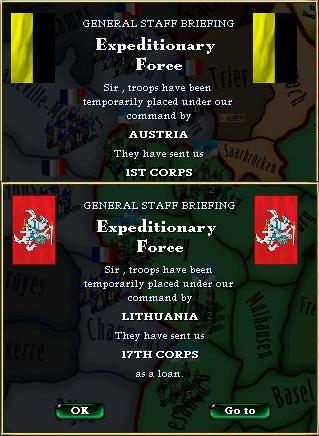
The Swabian offensive quickly breaks through the weak French lines, seizing control of several provinces.
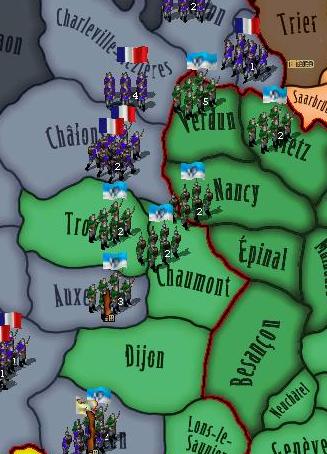
France responds by sending 8 divisions into Verdun, engaging its 5-division garrison in battle.
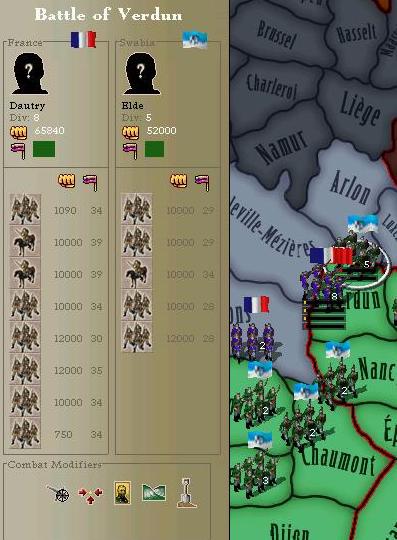
The expeditionary corps begin to arrive in Swabia in March, and shortly thereafter, the 20-division reserve is deployed to the front. The French are still making a weak showing, the position of the bulk of their army remaining unknown.
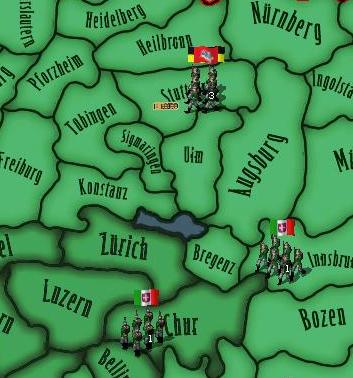

After a fierce battle with heavy losses on both sides, the French are defeated in Verdun thanks to Swabian reinforcents.

As the Swabians continue to advance on Paris, the disposition of the French main army becomes much clearer, as it is discovered that some 170,000 french soldiers are deployed around the capital itself.

The Swabian fleet takes to the sea in July to prevent a rumored Iberian attempt to seize The Baleares. An Iberian fleet is engaged and broken outside Mallorca's coast.

In August, the tides of fortune begin to turn in France as a massive French offensive from Paris and Flanders succeeds in pushing the Swabians out of Luxembourg and turning aside an offensive directed at Paris itself.

As the French army presses against the Swabian line, revolutionary partisans rise up behind it, forcing Mathas to send much needed divisions to defend already 'pacified' regions.

Meanwhile, the goliath war in Asia is not going well for the Qin, having to defend an enormous front against both the Khanate in the north and the Ming in the west.
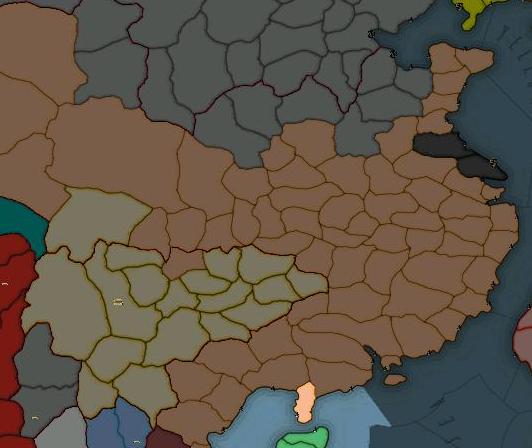
After nine months of valiant resistance, Dauphine surrenders in September, and is made an Iberian satellite.
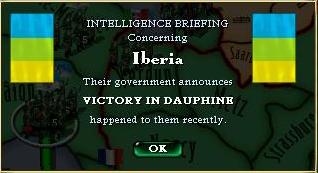
With Zuhriman now free to advance through Dauphine into Swabia itself, Mathias sends a pleading letter to London asking Great Britain for assistance. Much to his surprise, the British agree, entering the war on Swabia's side.
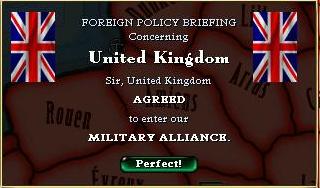
Five divisions are diverted to protect the border to Dauphine and a tactical withdrawal ordered along the length of the front. By summer of 1811, Swabia has been pushed back to the border, where the troops dig in defensively for rest and reinforcements.
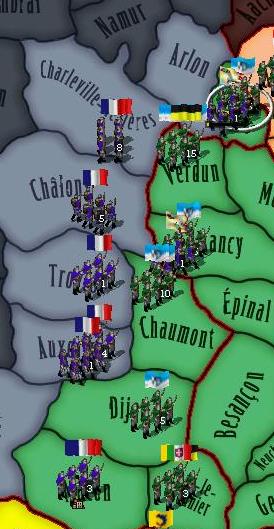
On the sea, battles are raging between Swabian and French ships as the Swabian fleet tries to keep the English Channel open for British troop transport ships.
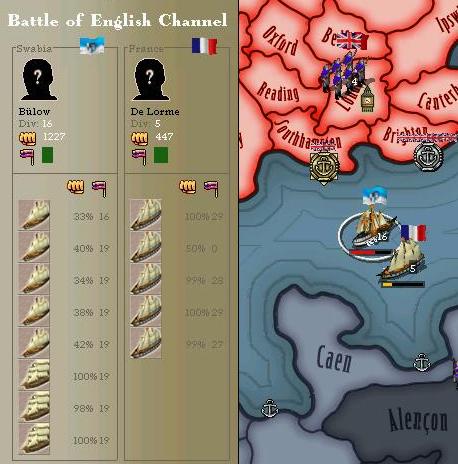
The French launch several futile attacks against the Swabian line in the autumn and winter of 1811, suffering heavy losses. By spring of 1812, the Swabian army has been bolstered with reinforcements and expeditionary corps, while the French center is in tatters. Seizing the moment, Mathias orders the center to advance and launch a two-pronged attack on Paris.

The French are caught completely by surprise, retreating in face of the ferocity of the attack.
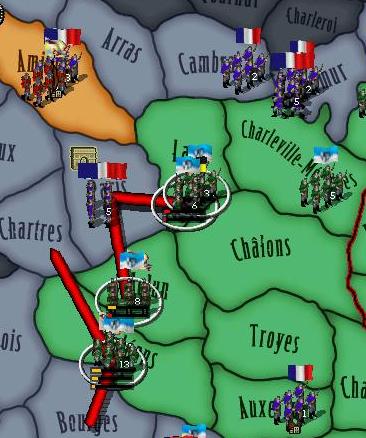
Five divisions enter Paris in March, repulsing a counter-attack by the French cavalry. In April of 1813, Paris falls.

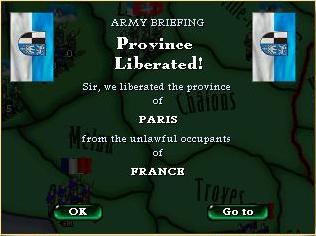
Foolishly overconfident, the Revolutionary Government has made no attempt to relocate from Paris, and many of the members of Parliament and the Elder Council are captured, along with dozens of Iberian advisors and dignitaries, the rest fleeing to Iberia to seek refuge in Córdoba. Without a head to govern it, the body of Revolutionary France flails about blindly for a few weeks, before finally accepting the inevitable. In June of 1813, Revolutionary France surrenders.

Magnamiously, Mathias decides to offer a full pardon to any parts of the French army that choose to join the fight against Zuhriman. Most of the French generals accept, and soon Iberia stands hopelessly alone.

The joint armies of Swabia and France cross the border into Iberia in autumn of 1813. Despite a brave and ferocious resistance, the Iberian armies are beaten back, hopelessly outnumbered. By January of 1814, Iberian Aquitaine is almost entirely under Swabian control.
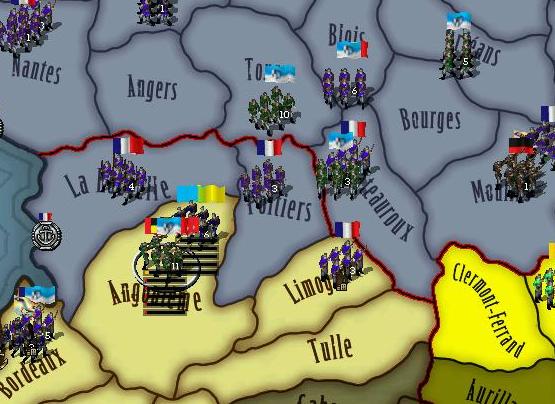
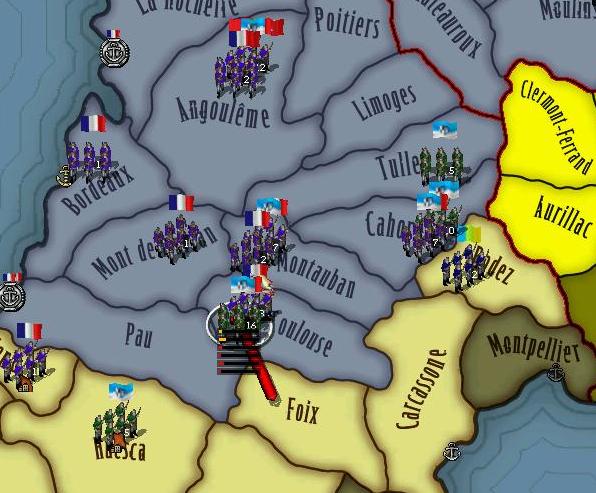
In February of 1814, 16 divisions under the command of Zuhriman himself are spotted advancing out of Dauphine into Aquitaine, racing for the front. As Mathias suspected, Zuhriman had planned to attack Swabia through Dauphine, only to be reached by the news of France's surrender before he even reached the border.

20 divisions are ordered to double back and engage Zuhriman's army, which makes its stand in Montauban. For weeks, Zuhriman beats back attack after attack, routing several French and Swabian armies, but without reinforcements and supplies, his position is untenable.
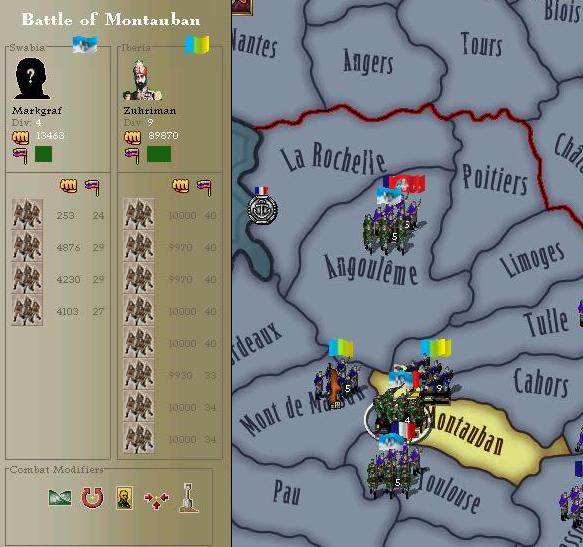
In May of 1814, a combined French and Swabian army of some 120,000 men launches a final offensive, breaking through Zuhriman's lines. Zuhriman is captured by a French cavalryman while attempting to escape the battle.

In June of 1814, the guns fall silent. Four years of bloody warfare has seen hundreds of thousands slaughtered on both sides, but at long last the armies of Iberia and France have been broken.
The revolution of Zuhriman is over.